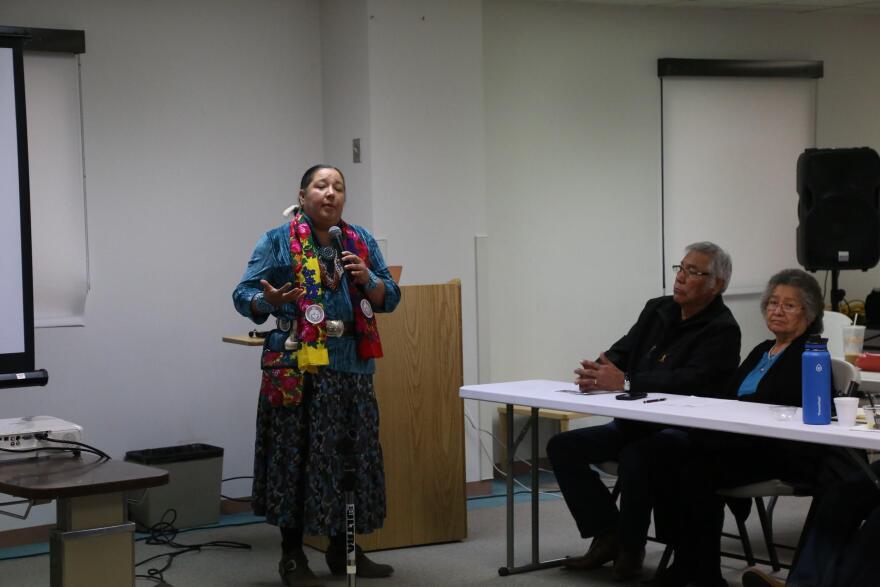GALLUP, N.M. — When Tyrannus White, 41, went missing here in March, his parents ran into a dizzying maze as they sought help from law enforcement to find their son.
“The city police department says, ‘We’re only looking for him within the city limits. Outside this belongs to the Navajo Tribe.’ And the state trooper says, ‘We’re only looking for him on the interstate.’ The sheriff told us to go back and work with the city police officers,” Tom White, Tyrannus’ father, said. “Every time we look into some of these law enforcement [agencies], we seem to just run into a wall.”
Tyrannus White, who is still missing, is a member of the Navajo Tribe. His father was speaking at a meeting hosted by the Missing and Murdered Diné Relatives working group here last week. Navajo Nation Council Delegate Amber Kanazbah Crotty started the group in March to gather information about missing Navajo tribal members.

It's unclear how many Native Americans go missing or are murdered each year. And while the issue of poor data collection on missing Indigenous women is slowly gaining traction in Washington, Crotty says families need help now.
“If you hear from the families, they’re just waiting for a call [from law enforcement],” Crotty said. “Where’s the accountability? Is anyone going to call them? Some families have been waiting for years.”
The working group is made up of volunteers with expertise in domestic violence, human trafficking, missing persons and other issues. It holds meetings to bring together local law enforcement, social service providers, government agencies, and researchers to share data, challenges and resources.
It also provides support to their families as they navigate jurisdictional issues and other challenges while seeking answers about their missing loved ones. Right now, the group is working on a toolkit to help families who have reported loved ones missing.
“It’s kind of like a guideline on what you do next,” Crotty said. “Because sometimes a family that’s in crisis will be like, ‘I made the call [to police], I gave them all the information, I don’t know what to do next.’ When actually, there’s a lot to do.”
It’s important to empower people like the Whites to search for missing loved ones, because most families don’t get much help from law enforcement, according to Meskee Yatsayte, a member of the working group and founder of the Navajo Nation Missing Persons Updates Facebook page.
“Without any evidence of the person being endangered, there’s no reason for law enforcement to go and search for them, and that’s the reality,” she said.
Yatsayte and other members of the working group successfully lobbied for the creation of a Missing Person’s Unit within the Navajo Nation Police Department, which was announced by Navajo Nation President Johnathan Nez in August. The unit will consist of seven victim advocates and a data analyst. But those positions have not been filled yet.

Crotty says she has asked for an update regarding the status of the positions, but has not heard back. And relations between the working group and Navajo Nation executive leadership seem to be strained. In a statement issued on Tuesday, Crotty criticized the Navajo Nation president and vice president for failing to consult with the group about its findings regarding missing people.
“We are sad to see that the [Office of the President and Vice President] continues to leave us out of these crucial meetings with high-level leadership,” Crotty wrote in the statement.
Navajo Nation Vice President Myron Lizer joined President Donald Trump on Tuesday for the signing of an executive order establishing a federal task force to study the issue of missing and murdered Indigenous women. The task force will consult with tribal governments to determine the scale of the problem, as well as develop new protocols for investigating missing persons cases involving Indigenous people.
The task force has two years to come up with recommendations, according to the order. But Crotty says the families of missing people need help now.
“I’m not waiting for the federal government — to convince them this is happening, or that we need this funding — I’m not even waiting for the Navajo Nation, and that’s why we’re doing what we’re doing,” Crotty said.
To date, the working group has hosted three public meetings on the Navajo Nation. The group is also planning to create a database to track the outcomes of all missing persons cases involving Navajo tribal members. Crotty says they are hoping to partner with Diné College in Shiprock, NM, or a department within the Navajo Nation on the database.
“‘We can do this together,’ is what I’m telling people,” she said. “All of us have the tools, we just need to talk to each other and get the right training in the right hands.”
The next Missing and Murdered Diné Relatives meeting will take place on the Navajo Nation in Utah in January.
Kate Groetzinger is a Report for America corps member who reports from KUER's Southeast Bureau in San Juan County.


